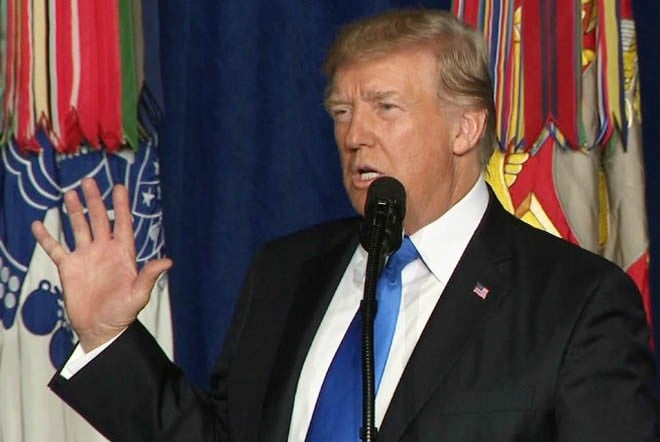
The road to peace in Kabul originates in Washington and goes through Islamabad

Various segments of Pakistani society in their all-misguided idealism earnestly believe that President Donald Trump will fix the Afghan quagmire by punishing Pakistan, the recalcitrant state. Many of them, glossing over the rule of Trump’s predecessors -- Bush and Obama -- are genuinely convinced the man will accomplish what doesn’t suit American interests at the court of Kabul.
The whole discourse surrounding the pacification of Afghanistan revolves around Pakistan being the ‘spoiler’ in the country. What Donald Trump said--"we can no longer be silent about Pakistan’s safe-havens for terrorist organisations, the Taliban and other groups that pose a threat to the region and beyond"-- is characteristic of what the US and some other states think of Pakistan’s role in Afghanistan.
The question is: who is mainly responsible for the current state of instability in Afghanistan?
There are three levels to understand why instability reigns supreme in Afghanistan. First, instability lies at the heart of Afghan domestic politics. There are Islamists versus nationalists; Pashtuns versus non-Pashtuns; and Khiljis versus Durranis. The inventory is not exhaustive. Put differently, Afghanistan would be unstable in the foreseeable future even if it is left to its own devices.
Second, there is a regional lens to Afghan instability. Involvement of the regional states in the Afghan power competition stokes the flames of fratricidal war. These states, ranging from Pakistan to Russia to Iran and India, in the mid-1990s, supported competing warring factions in the country. Practically, it meant Pakistan versus the rest. Nevertheless, for the last six to seven years, the interests of these states, save India, have converged on Taliban as a counterweight to US-backed Afghan national government.
At the third and most important level, the international level, the US-led invasion of Taliban-led Afghanistan back in 2001 spawned the current phase of instability in Afghanistan. Worse, since 2001 onwards, Washington’s policy towards Kabul remains informed by the proverbial maxim of playing both ends against the middle. This policy entails allowing Kabul’s neighbours to pursue their competing interests in Afghanistan with a tacit understanding not to generate a crisis that may spiral out of control. Taliban’s resurgence in Afghanistan is, in no small measure, the result of American connivance or at least indifference to regional states’ support to the Islamist militia. The goal behind allowing a manageable crisis is to justify American presence in Southwest and South Asia.
Read also: Marked with mistrust
Put this way, the US, Pakistan and Taliban are on the same page. The apparent reason why Washington is getting tough on Islamabad emanates from the fact that, from the former’s viewpoint, the latter is allegedly overstepping the tacit understanding: the recent wave of orgy of violence in Afghanistan, for which the Taliban stand accused, has indisputably occasioned the crisis of governance, hence questioning the very rationale of NATO in the country.
Here it is important to mention the role of China, an important international and regional player. For some people, the BRICS summit’s declaration, holding a number of militant outfits including Taliban, allegedly supported by Pakistan, as responsible for regional violence, hinted a change in China’s policy towards Pakistan. This position borders on naivety. Beijing’s acquiescence to Indian demand was a sop to Delhi. China needs stability at the court of Kabul also for the execution of its One Road One Belt (OBOR) project. For communist China, it does not matter whether Afghan is secular or Taliban Islamists rule Kabul, save there is some surety that Uighur militants are not sheltered.
How then to pacify Afghanistan?
First, change at the international level will induce change at the regional level. The US needs to come clean on what it really wants in Afghanistan. Allowing Taliban and others of their ilk to operate in Afghanistan but holding others responsible for violence is the height of duality. It is most likely that the US wants a long term stay in Afghanistan. Once the Taliban are treated as enemies, this will send a strong message to Pakistan and rest of the regional states.
Perhaps, being the most powerful actor in Afghanistan, in the regional context, Pakistan needs to be incentivised to decisively break with Taliban. For Pakistan, one main concern in Afghanistan is what it believes to be the threatening presence of India there.
Third, at the domestic level, Afghanistan will pacify once the international and regional involvement cease to exist though it will take time.
To recapitulate, the preceding discussion has tried to establish the overriding role of international level to spawn change at the regional level when it comes to pacifying Afghanistan. At the regional level, the role of Pakistan, subservient to that of the US, is pivotal. Thus, the road to peace in Kabul originates in Washington and goes through Islamabad.